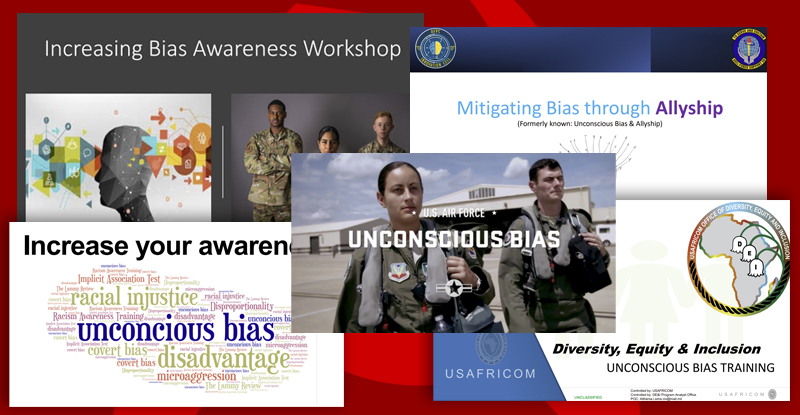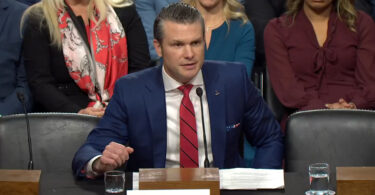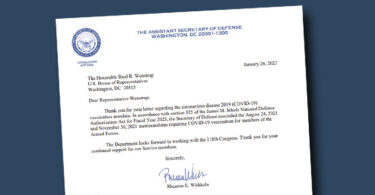Here’s evidence that “unconscious bias” training in DoD is based on pseudoscientific theory to advance a political agenda. As the author states, the government should terminate every program based on it.
By David Randall | City Journal
In the Wall Street Journal, Mahzarin Banaji and Frank Dobbin recently published “Why DEI Training Doesn’t Work—and How to Fix It,” a defense of implicit-bias research in the guise of a critique of current corporate diversity, equity, and inclusion trainings.
Banaji is one of the two inventors of the concept of implicit bias, and of the related implicit association test (IAT). She and Dobbin hope to acknowledge the flaws of DEI trainings while preserving implicit-bias research—and the associated program of political activism.
The authors lament that DEI trainings elicit shame in their subjects, and that they are largely being used to bolster workforce-management policies against possible litigation.
Their problem with DEI trainings is not that they are discriminatory, but that they do not strike the right tone:
“Reminding managers that they can use these tools to suss out problems and nip them in the bud helps them to feel capable of managing biases and microaggressions. When managers use these skills, they retain women and people of color for long enough to come up for promotion. . . . training isn’t designed to blame people for their moral failings. Instead, it’s galvanizing them to support organizational change by arming them with knowledge.”
The problems with DEI trainings are not in their tone, however, but in their substance.
The implicit-bias theory (also called unconscious-bias theory) on which these trainings are based has no scientific basis, as years of examinations have consistently demonstrated.
Lee Jussim puts it politely in his “12 Reasons to Be Skeptical of Common Claims About Implicit Bias,” but the Open Science Foundation’s archive of Articles Critical of the IAT and Implicit Bias renders a harsher verdict.
In 2011, Etienne LeBel and Sampo Paunonen reviewed evidence that measures of implicit bias possess low reliability. In other words, when you test for implicit bias multiple times, you rarely get the same result. Their conclusion was that some part of “implicit bias” is really “random measurement error.”
In 2017, Heather Mac Donald’s intensive examination of the theory and its empirical basis (or lack thereof) concluded that the “implicit-bias crusade is agenda-driven social science.”
And Bertram Gawronski’s 2019 review of the scholarly literature on implicit-bias research also concludes that
- there’s no proof that people aren’t self-aware enough to know what’s causing their supposedly “implicit” or “unconscious” biases; and
- that you can’t prove that there’s any relationship between how people do on the test and how they behave in the real world.
As far back as 2009, Hart Blanton and colleagues reexamined research data on implicit bias.
They found that 70 percent of whites who supposedly displayed implicit bias against blacks actually discriminated in favor of blacks.
It’s not just that there’s “insufficient evidence” that implicit bias doesn’t matter. There’s even evidence of a negative correlation between “implicit bias” and actual behavior.
So we shouldn’t just be “skeptical” of implicit-bias theory. We should scoff at it.
In 2023, Jason Chin and colleagues noted that the entire field of behavioral-priming research has been largely discredited, which, in turn, eviscerates the basic framework justifying the argument that implicit-bias training reduces prejudicial behavior.
As for the implicit-attitude test, Edouard Machery’s scathing 2022 article concludes:
“We do not know what indirect measures measure; indirect measures are unreliable at the individual level, and people’s scores vary from occasion to occasion; indirect measures predict behavior poorly, and we do not know in which contexts they could be more predictive.”
Banaji and Dobbin’s article also fails to reveal how crucial implicit-bias theory has been in support of the legal imposition of such trainings, whether labeled as DEI or not.
Since 2007, the Equal Employment Opportunity Commission has “encouraged” employers to adopt diversity trainings preemptively to protect themselves against legal liability for “unconscious bias.”
In government, the trainings have been imposed by presidential executive order, the Centers for Disease Control and Prevention, the Department of Education, the Department of Justice, the Office of Science and Technology Policy and Office of Personnel Management, the State Department, and the states of California, Illinois, Maryland, Massachusetts, Michigan, Minnesota, New Hampshire, New Jersey, New York, San Francisco, and Washington.
Moreover, “implicit bias” is an essential tool by which progressive activists have worked around federal antidiscrimination law’s requirement of proof of discriminatory intent.
The implicit-bias standard allows lawyers to seize on the law stating that a “hostile environment” is an actionable offense under antidiscrimination law.
Implicit-bias doctrine allows any inequity to be treated as evidence of bias, and hence of a hostile environment.
Implicit-bias theory is the prerequisite for dispensing with intent in anti-discrimination law.
It would be hard to establish in a court of law whether instilling shame was the goal or just a byproduct of DEI trainings. It would be desirable if the DEI advocates could produce trainings that did not have that effect.
But Banaji and Dobbin ultimately oppose eliciting shame not primarily because it is wrong but because it will hamper the political activism they favor.
Professional critiques of implicit bias have shown, politely but repeatedly, that there is nothing there.
Activists and scientists who think that science should serve political objectives want to believe in the existence of massive systemic bias to justify their goals of imposing “equity” by law and by litigation.
Implicit bias is a pseudoscientific theory made to order for this purpose.
It’s a house of cards, and governments and the private sector should terminate every program based on it.













Leave a Comment